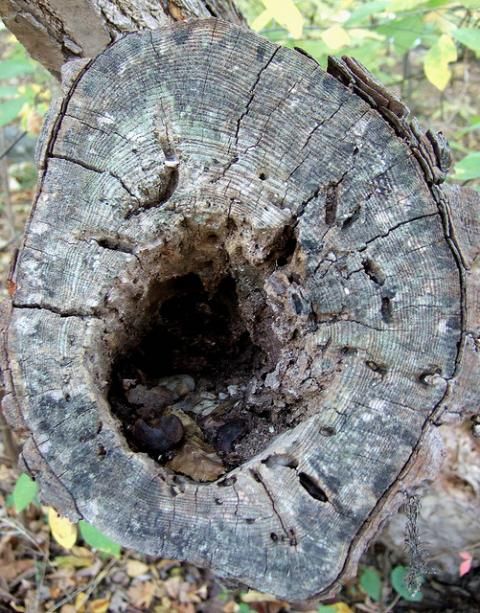
While most of the nation's political middle seems to be going the way of the dodo, centrists hang on in NY's 24th Congressional district. Photo of hollowed-out tree by Flickr user joelogon; published under Creative Commons license.
Last week, former upstate GOP Congressman Sherwood Boehlert made quite a splash in scientific and environmentalist circles with a ringing editorial he penned for the Washington Post. In it, Boehlert took his party to task for what he called "wholesale, ideologically based or special-interest-driven rejection of science":
National Journal reported last month that 19 of the 20 serious GOP Senate challengers declared that the science of climate change is either inconclusive or flat-out wrong. Many newly elected Republican House members take that position. It is a stance that defies the findings of our country's National Academy of Sciences, national scientific academies from around the world and 97 percent of the world's climate scientists.
Today, the Daily Star ran an interview with Boehlert that paints the retired Congressman as "one of a dying breed" -- a moderate Republican unafraid to defy his party, especially over matters concerning science and the environment. Unsurprisingly, Boehlert thinks things are getting worse:
"So much is polarized now, especially on TV, that it's hard for people to be informed. You have Keith Olbermann and Rachel Maddow on one side and Glenn Beck and Rush Limbaugh on the other, but where are the balanced arguments, the respect for what your opponents are saying?" he asked.
Boehlert represented upstate New York in Congress through four Presidential administrations (1983-2007), and chaired the House Science Committee from 2001 to 2007. He has long been a champion of scientific research and a dogged centrist on environmental matters. He also played a critical role in the sucessful passage of the original U.S. cap-and-trade bill: the 1990 amendments to the Clean Air Act that established a cap-and-trade system to reduce sulfur dioxide emissions from coal-fired power plants.
Boehlert's long career speaks for itself, but it also has a lot to say about his district, the flip-flopping 24th. It seems that even in these polarizing times, Boehlert's district still leans toward the middle: In this month's election, Republican newcomer Richard Hanna wrested the seat once held by Boehlert from Democrat Michael Arcuri. But though he'll come to power as part of a wave of tea-flavored GOP victories in the House, Hanna talks a lot more like a centrist than a Tea Partier. From an interview last week with ThinkProgress:
INTERVIEWER: There’s a lot of people in your party that are already talking about taking a hard line and not compromising with the president. What do you think? Is it too early, are you going to get your feet wet and then decide, or are you going to take a hard line, are there certain things you won’t compromise on?
HANNA: I’m sure there are, but I’m sure there’s many things I’m sure we’ll be able to work together with. I don’t feel that way. And I think that ultimately if the Republican Party takes that kind of posture, then they will be punished in two years, because people are sick of partisanship. And I think if you live in New York you have a particularly good view of the product it makes over time. That’s not my goal, my goal is to find solutions and work for them.
(The nationally-focused ThinkProgress didn't bother to boldface Hanna's zinger about New York State, but his point's well taken by anybody living under Albany's dirty thumb.)
Meanwhile, elsewhere in the nation, the spirit of bipartisanship continues to thrash around in its death throes. Another moderate Republican Congressman, South Carolina's Bob Inglis, lost the Republican nomination in a landslide this year to climate-change-denying Tea Partier Trey Gowdy. Here's Inglis at a subcommittee hearing in the House last week, taking a parting shot at his fellow Republicans over the climate issue:
“Your child is sick,” he said. “Ninety-eight doctors say treat him this way. Two say no, this other way is the way to go.”
By taking the minority viewpoint that carbon emissions are not a problem, “you’re taking a big risk with those kids,” he said.
On clean energy development, Mr. Inglis warned his Republican colleagues that China was preparing to “eat our lunch.”
“They plan on innovating around these problems, and selling to us, and the rest of the world, the technology that’ll lead the 21st century,” he said. “We may press the pause button for a few years, but China is pressing the fast-forward button.”
ClimateProgress, an influential climate-science blog run by physicist and former Clinton energy adviser Joseph Romm, reported last week that most of the incoming Republicans are climate-change deniers:
Well over half (55 percent) of the incoming Republican caucus are climate zombies. Thirty-five of the 46 (76 percent) Republicans in the U.S. Senate next year publicly question the science of global warming. Of the 240 Republicans elected to the House of Representatives, 125 (52 percent) publicly question the science.
Of the freshmen Republicans...36 of 85 in the House and 11 of 13 in the Senate have publicly questioned the science. There are no freshmen Republicans, in the House or Senate, who publicly accept the scientific consensus that greenhouse pollution is an immediate threat.















